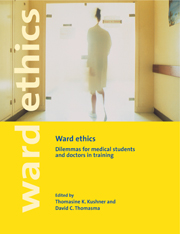Book contents
- Frontmatter
- Contents
- Acknowledgments
- List of contributors
- Prologue. Breaking the silence
- Letter from a young doctor
- Part I On caring for patients
- Section 1 Performing procedures
- 1 The responsibility of informing
- 2 Treating despite discomfort and self-doubt
- 3 Blaming the patient
- 4 Breaking the code: is a promise always a promise?
- 5 The newly dead
- 6 Asking for help: who's listening?
- Section 2 Problems in truth-telling
- Section 3 Setting boundaries
- Part II On becoming a “team player”: searching for esprit de corps and conflicts of socialization
- Section 5 Argot, jargon, and questionable humor: assuming the mantle at the patient's expense
- Section 6 Making waves: questioning authority and the status quo
- Section 7 Perceiving misconduct and whistle-blowing: observing peers or superiors commit an act deemed unethical
- Epilogue: Using this book
- Glossary
- Index
2 - Treating despite discomfort and self-doubt
Published online by Cambridge University Press: 05 February 2015
- Frontmatter
- Contents
- Acknowledgments
- List of contributors
- Prologue. Breaking the silence
- Letter from a young doctor
- Part I On caring for patients
- Section 1 Performing procedures
- 1 The responsibility of informing
- 2 Treating despite discomfort and self-doubt
- 3 Blaming the patient
- 4 Breaking the code: is a promise always a promise?
- 5 The newly dead
- 6 Asking for help: who's listening?
- Section 2 Problems in truth-telling
- Section 3 Setting boundaries
- Part II On becoming a “team player”: searching for esprit de corps and conflicts of socialization
- Section 5 Argot, jargon, and questionable humor: assuming the mantle at the patient's expense
- Section 6 Making waves: questioning authority and the status quo
- Section 7 Perceiving misconduct and whistle-blowing: observing peers or superiors commit an act deemed unethical
- Epilogue: Using this book
- Glossary
- Index
Summary
CASE
“Aren't you done yet?”
The only surgery I was able to do as a third year medical student involved a deltoid abscess on a patient who was an IV drug user. He had suffered a number of traumatic accidents and infections. The patient had been “skin popping” and injecting heroin directly into his skin, because his veins were no longer accessible. Abscesses are a common result of this practice.
A first year resident supervised me during the surgery, but I was very aware that I probably would not have been allowed to do the surgery if the patient had been a member of the Hospital Board instead of this black man who was clearly a medical “train wreck.” I was also hounded by the nurses and anesthesiologist who thought I was taking too long. They were all after me to “hurry up” and kept asking “Aren't you done yet?”
I was sweating because this was my first surgery and the rest of the team just wanted to get out of there.
CASE
“Have you ever done a lumbar puncture?”
We were doing an evaluation for headaches on an elderly gentleman. The patient was alert and could hear everything that was being said. The neurosurgical resident asked, rather casually I thought, “Have you ever done a lumbar puncture?” I told him I had.
- Type
- Chapter
- Information
- Ward EthicsDilemmas for Medical Students and Doctors in Training, pp. 33 - 42Publisher: Cambridge University PressPrint publication year: 2001
- 2
- Cited by



